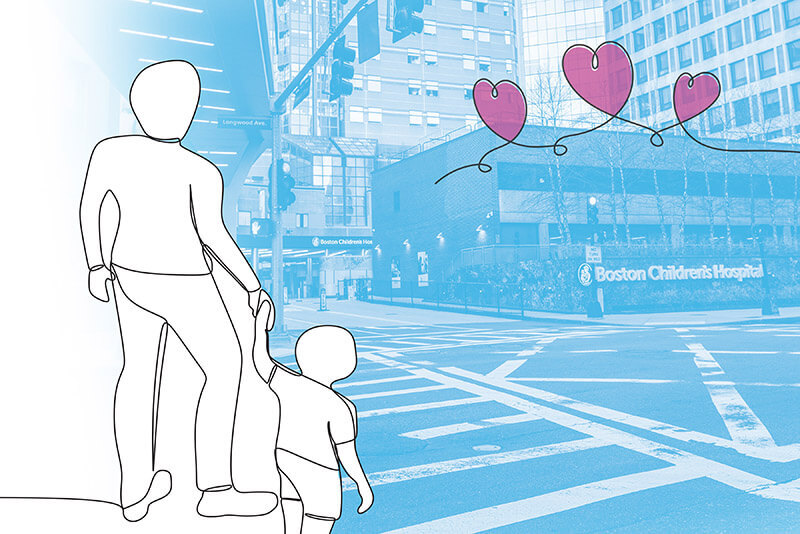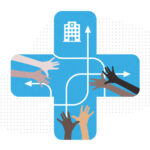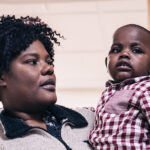Signs of diabetes and other medical emergencies: Don’t delay care during the COVID outbreak

Merlin Ladd had been home from school for about six weeks when his parents started to notice that something was off. At first, they thought that the 13-year-old — like many of us — was simply in a funk from being stuck inside due to the COVID-19 outbreak. “He seemed lethargic and out of sorts,” remembers his mom, Lisa.
But when Merlin developed stomach pains and began vomiting, Lisa and her husband, Merlin III, knew they had to take action. A visit with his pediatrician revealed extremely high blood sugar levels, a sign of undiagnosed diabetes. Merlin’s doctor quickly referred him to Boston Children’s Hospital for emergency care. There, the family learned that Merlin had diabetic ketoacidosis (DKA), a potentially life-threatening complication that can occur in people with uncontrolled or undiagnosed type 1 diabetes.
While the prospect of traveling from their home in Plymouth, Massachusetts, to the city — and a hospital — in the middle of a pandemic was scary, Merlin and his parents knew what they had to do. “We didn’t think twice,” says Merlin III. “We just jumped in the car and started driving.”
A worrisome trend
Leo Reed, 12, recently had a similar experience. What his parents thought was general crabbiness and increased thirst from playing ball in their yard turned out to be symptoms of type 1 diabetes. “In retrospect, these are classic signs of diabetes,” says his mom, Jill. “But at the time, we thought he was just struggling with digital learning and was feeling cranky.”
Merlin and Leo aren’t alone. “Since February, we’ve seen a significant increase in the number of kids with previously undiagnosed type 1 diabetes coming to the hospital in DKA,” says Dr. Katharine Garvey, director of Boston Children’s Diabetes Program. “Many of these cases are quite severe, a sign that this has been going on for some time.”
Indeed, DKA, a dangerous state with rising levels of ketones and acid in the body, is further along the spectrum of how type 1 diabetes can present itself. If the earlier symptoms of diabetes — such as increased thirst and urination, fatigue, blurry vision, and weight loss — are missed, DKA can eventually occur.
That could be because families are stretched thin with the demands of working and learning from home, because they’re focused on the threat of the new coronavirus, or both. Concerns about safety and social distancing may be leading families to avoid their clinician’s office or emergency department (ED)— and when they do seek care, it’s often for what they worry might be COVID-19. “Some children who have since been diagnosed with type 1 diabetes initially came to the ED with shortness of breath, which is a symptom of COVID-19 but also of severe DKA,” explains Dr. Garvey.
Symptoms that shouldn’t be ignored
Signs of type 1 diabetes aren’t the only symptoms that merit a call to your child’s pediatrician.
“Anything that would have brought you to your doctor or to the hospital before the pandemic should bring you in now,” says Dr. Mark Waltzman, an emergency medicine physician at Boston Children’s and South Shore Hospital.
That includes traumatic injuries like lacerations, sprains, and strains, as well as increased bruising and enlarged lymph nodes, potential signs of leukemia. Parents should also keep an eye out for symptoms associated with the new multi-system inflammatory syndrome in children (MIS-C) related to COVID-19. These include fever, rash, and abdominal pain. In all of these cases, time is of the essence. “The sooner parents seek care for such conditions, the better a chance their child has of recovering,” explains Dr. Waltzman.
No hesitation
Even as families are spending more time together in close quarters, it’s easy to miss early symptoms, especially when you’re struggling with work or school, trying to find food, and grappling with our “new normal.” The best approach is to take a few minutes to talk with your child about how they’re feeling — both physically and emotionally, says Dr. Waltzman. He and his colleagues also expect to see more kids and teens coming to the hospital with depression, anxiety, suicidal thoughts, and other mental health concerns as the pandemic and its effects wear on.
One thing to remember: Don’t let fear of the virus keep you from the hospital. Merlin and his parents say they were quickly reassured upon arriving at Boston Children’s ED. “It was kind of a relief,” says Merlin. “Everyone was wearing masks, gowns, and gloves, and I knew they were there to help me.”
Today, Merlin and Leo are both acclimating to their new diagnoses and feeling much better. They’re attending follow-up appointments with the Boston Children’s Diabetes Program through virtual visits. And their parents say they’ll return to the hospital for care if necessary.
“We didn’t know what to expect at first, but we felt extremely safe going to the hospital — much safer than we would at a grocery store, for example,” says Merlin III. “We want other parents to know that they should follow their instincts. You wouldn’t hesitate to get help for your kids before. Don’t hesitate now.”
Get more answers about Boston Children’s response to COVID-19.
Related Posts :
-

BRD7 research points to alternative insulin signaling pathway
Bromodomain-containing protein 7 (BRD7) was initially identified as a tumor suppressor, but further research has shown it has a broader role ...
-

Revisiting race and ethnicity in clinical guidelines
Health care institutions often rely on clinical pathways in assessing patients and making decisions about their care. Some of these ...
-

A state policy made it harder for families to find shelter. Research helped change the policy.
Physicians and policy makers usually work in separate worlds: those of medicine and government. But when a change in Massachusetts ...
-

An off-the-shelf tamponade kit provides surgeons with ‘the luxury of time’ during a life-threatening emergency
It was a late Friday afternoon in April when the call came: A young boy was being transferred to Boston ...





